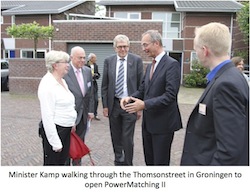A smart energy pilot project is launching in Groningen and Hoogkerk, Netherlands that will allow consumers to test innovative, smart energy services related to sustainable energy choices and cost savings. Six Dutch companies along with three knowledge institutes and 40 households will participate in the project designed to ascertain which smart energy services best meet the consumer’s requirements. The goal is to give guidance on how to  implement a sustainable and cost effective energy supply. This is the first time that consumers are involved in such research.
implement a sustainable and cost effective energy supply. This is the first time that consumers are involved in such research.
The trial forms part of PowerMatching City’s second phase. PowerMatching City is the world’s first live, total-concept smart grid. These linked, intelligent (digitally) controlled energy grids are essential for achieving a proper match between energy demand and supply. Economic Affairs Minister Kamp initiated the second phase during a festive meeting with the participants from the City of Groningen’s Thomsonstreet.
“I am delighted that today we are taking a new important step towards the energy system and the energy consumer of the future together with households, companies and knowledge institutes,” said Albert van den Noort, PowerMatching City II’s Project Manager. “Changes are often achieved through means of open innovation in which players from different backgrounds and disciplines work together. PowerMatching City is a good example of this.”
In the context of energy savings, using a tablet, participants to Power Matching City II will be given accurate insight into their own energy consumption and generation down to five minutes. Since the consumer is not only provided with accurate insight into his energy consumption behavior, but also in the costs associated with this, he can control his own  energy consumption on the basis of costs. In addition, an assessment will be conducted to determine to what extent the consumer, as part of a local community, is prepared to collectively use as much sustainable energy as possible. The extent to which sustainability is a motivating factor in their own energy consumption behaviour will be investigated.
energy consumption on the basis of costs. In addition, an assessment will be conducted to determine to what extent the consumer, as part of a local community, is prepared to collectively use as much sustainable energy as possible. The extent to which sustainability is a motivating factor in their own energy consumption behaviour will be investigated.
PowerMatching City II has added 10 electric vehicles to the pilot. A wide scale of innovative energy technologies and equipment will be used, including energy storage, peak shaving, hybrid heat pumps, micro CHPs (combined heat and power), smart charging stations for electric transport and smart household appliances. The PowerMatching City consortium consists of the project partners DNV KEMA, Enexis, Essent, Gasunie, ICT Automatisering and TNO, as well as Technical University Delft, Technical University Eindhoven and the Hanze University of Applied Sciences, Groningen.

